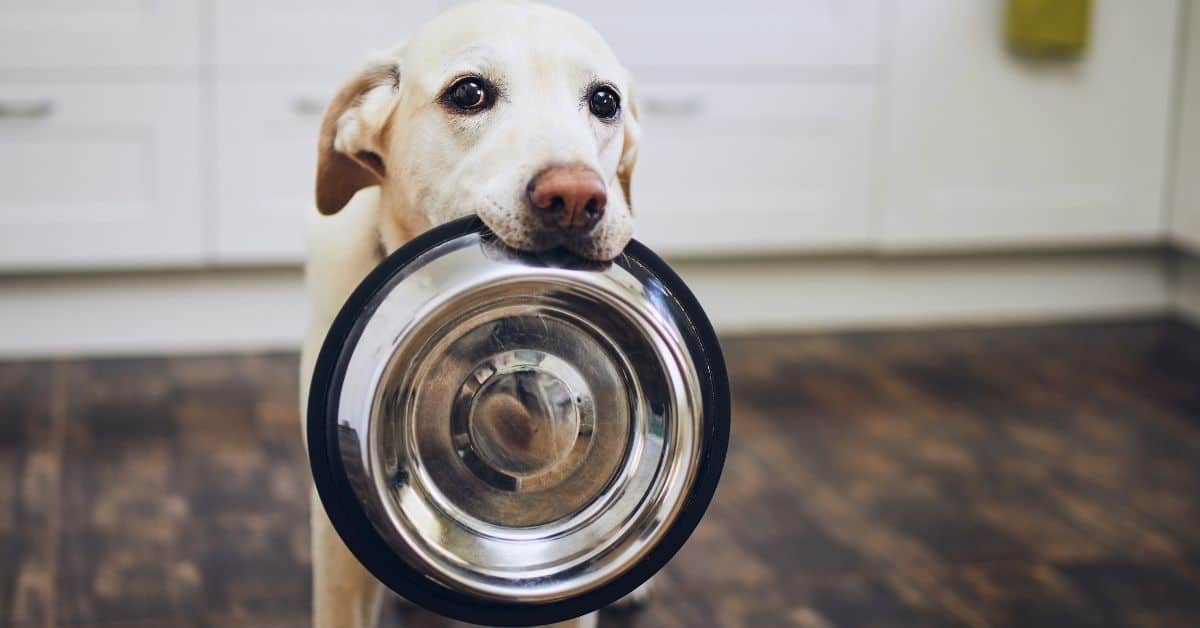Do you feel like your hungry dog could eat forever?
Some will eat everything on their plate and continue to follow you around the house, looking for more food.
When it comes to why dogs are always famished, the leading causes may come as a shock.
There are several potential causes for a dog’s constant hunger.
Genetic predisposition to constantly have the urge to eat
Numerous medical conditions can influence appetite and eating patterns
Panic eating is one of many undesirable practices that can result from mental health issues
Untrained dogs might rely only on their ingrained instincts and consume anything they can
Consider a few things if your dog acts like they are famished while eating high-quality dog food in regular, portioned meals.
As you know now the answer to the question “why is my dog always hungry”, let’s examine why they constantly seem hungry and how to calculate the right serving size for your pet.
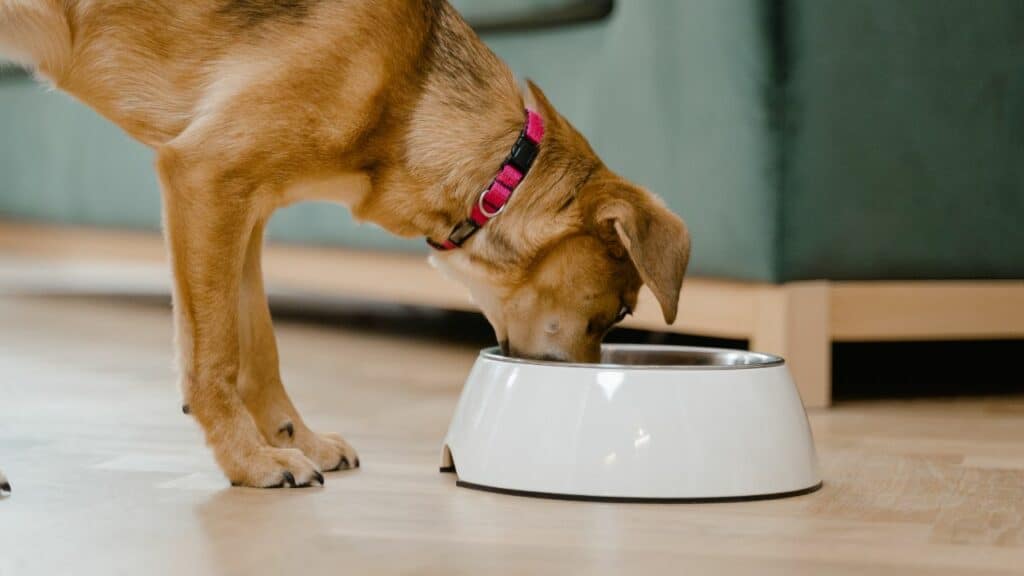
Reasons Your Dog Is Hungry All The Time?
Why is my dog hungry all the time?
For various reasons, your dog may appear to be constantly hungry; however, this does not necessarily indicate that they are not getting enough food.
It could be due to your routine with them, their biology, or an underlying health issue if you’re giving your dog the recommended serving sizes of high-quality dog food daily, but they still seem to want more.
Genetical Reason
Since dogs descended from wolves, some genetic remnants of their wolf ancestry may remain.
Humans had to make sure to eat anything they could get their hands on before farming.
You can never be sure where your next meal will come from if you only hunt and scavenge for food.
That might require going without food for days in some settings and climates.
Although wolves and dogs are pack animals, which can make it simpler to acquire food, the rigid hierarchy makes it necessary for everyone to engage in conflict over the leftovers to receive their fair portion.
Puppies, whose bodies require a lot of fuel due to their rapid growth, frequently consume anything they see.
Force Of Habit
Experts assert that the domestication of dogs started when wolves acquired the extraordinary capacity to sway us into feeding them food leftovers.
Even though our pets have been domesticated for a very long time, they have developed methods for obtaining food and treats from us.
When your friend gives you “the look,” it can be difficult to refuse them a snack.
However, if you do, you’ll encourage their behavior and teach them that the more hungry they are, they will likely obtain a taste of the good things.
Our dogs have taught us to give them food when they ask for it, in a way.
Your dog might want a few delectable human foods, which doesn’t necessarily mean they are hungry.
Emotional Reason
The dog’s insatiable appetite can be due to emotional reasons.
Like people, dogs can experience nervousness and anxiety, affecting their insatiable appetite.
Some dogs are naturally timid, so place or crate training, as described below, may be beneficial.
Several training methods can be used to lessen anxiety, but no matter which method you choose, it’s essential that your dog has a calm, distraction-free space where it can feel secure.
Canine Biology
According to a study on meal quantities and consumption in dogs, some incidences of obesity and overeating in domestic dogs are linked to the owner’s feeding habits.
Because of their possible wild ancestry, many dogs have a “eat when food is available” mentality and may only eat when it is provided rather than when they are starving.
A domestic dog’s closest wild relative, the grey wolf, lives on a feast-or-famine diet.
They consume a lot of food when it is available because it can be days before their next meal.
This inclination of dogs may be one factor in your dog’s constant excessive hunger.
Health Concerns
Some dogs adore eating and will always eat when you give them a snack or meal, but if your dog is consistently ravenous, there may be a health concern lurking beneath the surface.
Your dog may become more hungry due to several common heal conditions, including:
Diabetes mellitus
Hyperadrenocorticism (Cushing’s Disease)
Hyperthyroidism
Poor absorption
Exocrine pancreatic insufficiency
Intestinal cancer
Bacterial overgrowth
Inflammatory Bowel Disease (IBD)
Your dog needs veterinary attention if he suddenly seems more ravenous than usual to ensure the dog’s appetite isn’t a sign of a significant medical problem.
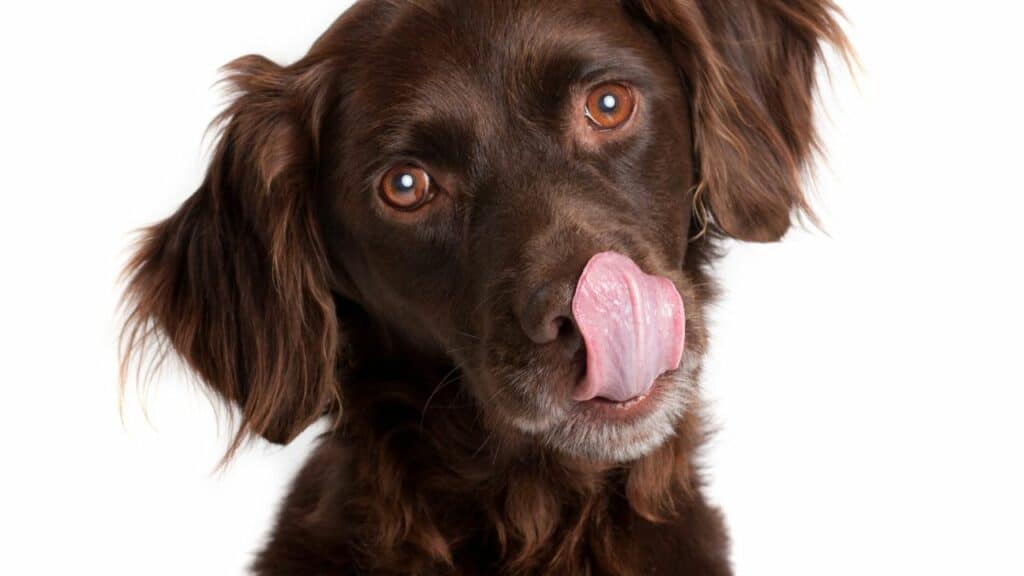
Anxiety
Canines are capable of emotional eating, much like their human companions. When they’re worried, many dogs may frequently demand their owner’s extra food.
Is there any explanation for your dog’s anxiety?
Does he exhibit any more signs of this condition?
Additional indications of anxiousness include:
Behaving compulsively or repetitively
Seeming restless
Constant barking
Lethargy
Destroying objects
Excessive panting
Defecating or urinating indoors
Aggressive behavior
There are steps you can take to support an anxious dog.
Take steps to increase your dog’s sense of security and comfort in daily life by consulting your veterinarian for advice.
Food Issues With Rescue Dogs
When a dog comes from a problematic past, such as being raised as a street dog, its instincts for feeding come to the fore.
That may include that they constantly scavenge food when offered and may even bury food for future use.
Often, if you are consistent with mealtimes, these dogs’ habits will subside over time.
Relating meals with other actions is a fantastic technique to give your dogs confidence that a meal is coming.
That enables people to believe in you and knows that you will provide for their needs. Walking your dogs in the evening, coming home, and then delaying feeding them for 15 minutes is one option.
Follow this pattern daily to give your dogs the required exercise and create a pattern and expectation of a regular supper for them.
To determine your dog’s ideal diet and age, consult your veterinarian.
Three meals a day, instead of two, may benefit certain dogs with active metabolisms.
There shouldn’t be any restrictions on the number of meals your dog can have as long as they are not getting overweight.
The daily food intake can be divided into however many meals your dog prefers.
Health Issue
The medical word for excessive or extreme hunger, polyphagia, in dogs is brought on by several common diseases.
If your dog becomes significantly more ravenous after reaching adulthood, you should get them examined.
Dog diabetes, both Type 1 and Type 2, might increase a dog’s appetite because, when a dog has diabetes, the body frequently has trouble assimilating blood sugar.
Additionally, insulin-related tumors can lower blood sugar levels, frequently affecting hunger.
Dog diabetes might sometimes show itself as excessive thirst.
Although parasites may not boost a dog’s appetite, they can make them lose weight, which may lead you to overfeed them to make up for it.
A dog will also suffer significant effects from cancer; thus, it is essential to consider whether an increase in hunger contributes.
Your dog needs veterinary attention if eating all his meals but is still underweight or losing weight.
If the dog consumes regular amounts of food, weight loss may be a sign of serious illnesses.
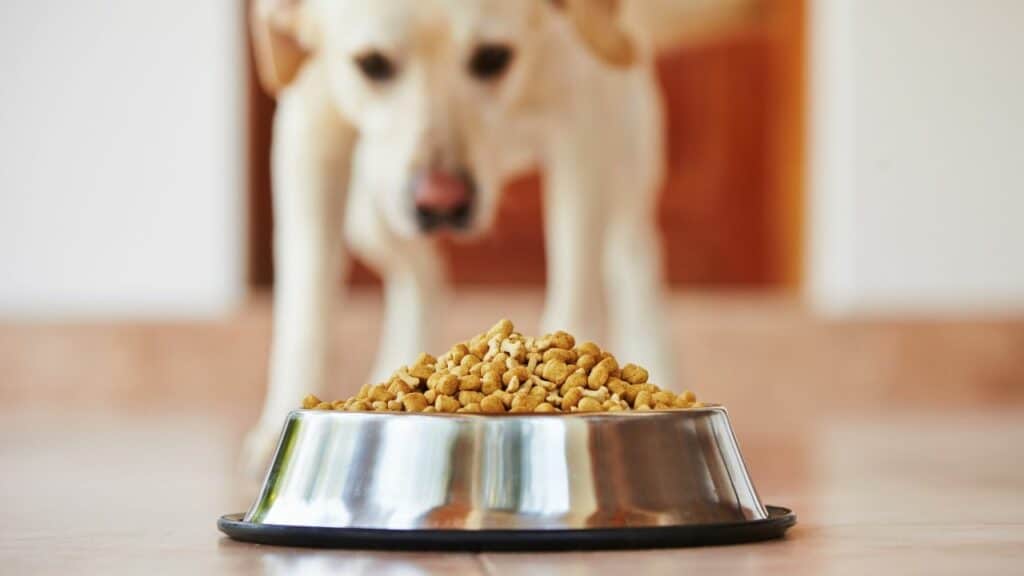
Is My Dog Always Being Hungry A Problem?
Even though some dogs approach each meal as if it were their last, this tendency is typically acquired.
If your dog is a rescue, it’s possible that they were food-deprived in the past, which made them feel the need to beg for food and eat it rapidly before it was gone.
Even well-fed, lavished-upon puppies can learn that pleading for more food results in goodies, which may drive them to act as though they are hungry.
Is there an issue if you overfeed your dog and they cheerfully consume the entire meal?
It must be good if your dog is pleased, right?
Well, maybe not always.
While giving your pets the right amount of nutritious food will help them stay healthy, overfeeding them can cause various health issues.
Although many dogs are only driven by food, a suddenly increased hunger may indicate a health problem.
What Can Stop My Dog From Being Hungry?
You should leave the meals for them when you begin a new feeding schedule until they move away from the food bowl.
The dog eats as much food in the bowl as is recommended.
By doing this, you can assist your dog in learning that it’s mealtime and that it’s okay to stop eating until the next meal.
Let’s now discuss four strategies you might use to control your dog’s increased dog’s appetite:
Reduce Your Intake Of Sweets
Although cutting back on goodies for hungry dogs may seem contradictory, if they’ve grown accustomed to receiving treats frequently, it’s a habit that needs to be broken.
As you gradually reduce the number of treats you give your dog, try substituting more playtime or other forms of positive attention.
While you can occasionally give your dog a treat, it’s best to give them low-calorie, low-fat treats made from fresh ingredients.
Just like in our diets, calories are essential in a dog’s diet.
Adjust Their Portion
Even though your dog might like heating large portions of food, they shouldn’t necessarily do so.
It’s crucial to discuss your dog’s dietary requirements with your veterinarian and to check the nutritional information on the food you give your dog to determine the proper serving sizes based on their size, age, and level of activity.
Most veterinarians advise feeding your dog according to its optimum weight rather than its actual weight.
To avoid abrupt, drastic increases or decreases in your dog’s meal sizes, it’s essential to modify portion sizes gradually and with your veterinarian’s assistance if your dog is severely underweight or overweight.
Meet Your Dog’s Requirement
A widespread misunderstanding among dog owners holds that older dogs only require less food than younger dogs.
However, dogs’ metabolisms slow down and become less effective at processing specific nutrients as they age.
Many senior formulas on the market contain fillers to bulk out their food, but your senior dog may have trouble digesting those fillers.
They can consume more while making their digestive systems work harder since such items pass through their systems undigested.
Older dogs can still get all the nutrition they need by eating slightly less of the right food while absorbing it all.
Fill Up On Nutrients
Not only older dogs but all animals need a healthy diet.
Each dog requires a variety of high-quality nutrients for good health, development, and energy.
High heat can destroy nutrients, and synthetic chemicals, which are harder for your dog to digest, are used in highly processed dog foods.
Fresh food that has been lightly cooked provides higher nourishment and is more straightforward for your dog to digest.
They can obtain more of the stuff they need more readily, without feeling the urge to overeat if you feed them nutritious food.
How Much Should My Dog Eat?
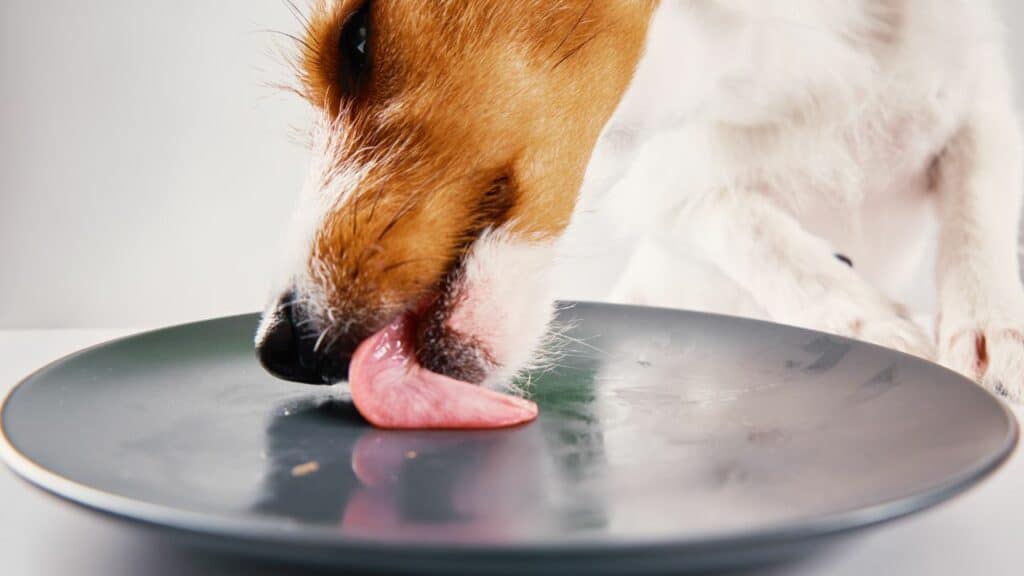
Feeding your dog the right amount of food for their health and wellness; too little food can result in nutritional deficiencies, while too much food can induce obesity and related health issues.
Following are some crucial considerations for choosing your dog’s appropriate meal size:
Weight
Metabolic rate
The type of food
Number of meals per day
The amount of exercise
To find the appropriate amount that your dog should be eating, look at:
The Dog Food You Are Using
The dog food you give your furry companion will significantly impact how much you should feed them because not all dog foods are created equal.
Different foods have varying protein and fat compositions, calorie counts, etc.
To obtain a general sense of how much they should eat each day, it’s a good idea to look at the feeding instructions included with the food.
Usually, feeding your dog twice daily would be best, with a 12-hour gap between meals.
Your Dog’s Lifestyle
Your dog’s daily exercise will also affect how much food they require daily.
Depending on how much exercise they receive daily, the dog’s breed and weight will require varying amounts of food; generally, more active dogs need a more significant diet than those who prefer to laze around most of the time.
You can use a dog-specific calorie calculator to obtain a good idea of what they need, but don’t count on it to provide a precise number.
Since every dog is different from every other dog, a calculator cannot accurately estimate the calorie count of your dog.
Your Dog’s Body Condition
The amount of food you give your dog can be adjusted based on how healthy they appear.
Your veterinarian can assist you in finding your dog’s specific calorie needs and body condition score.
The following are typical indicators of a healthy weight in dogs:
Their hips and chest are more comprehensive than their abdomen
They have an hourglass-like form when viewed from above
When they stand up, their chest touches the ground before their stomach
Their ribs should be easily palpable with light pressure but not apparent
Conclusion: Why Is My Dog Always Hungry
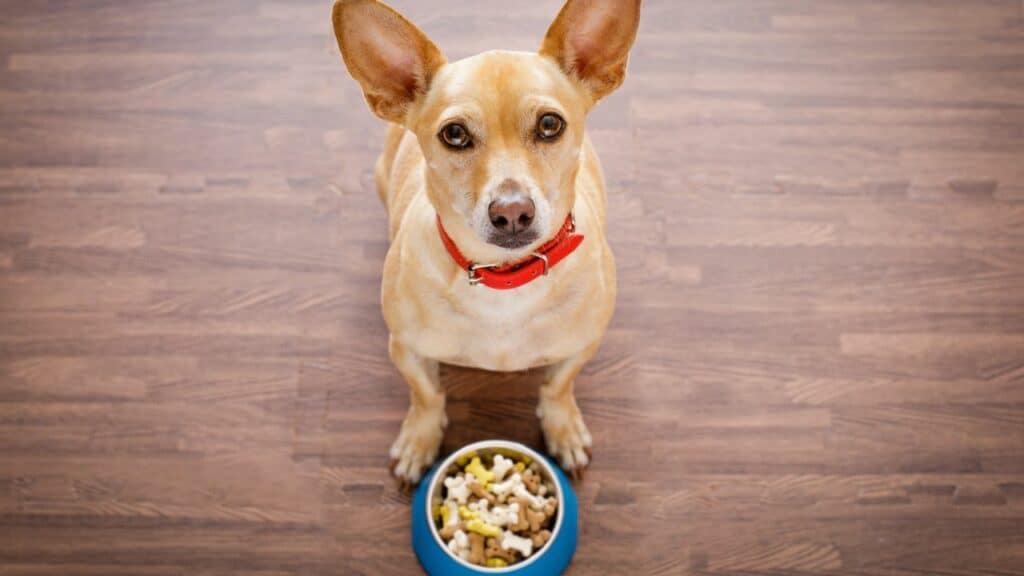
Before You Go…
Now you know the answer to the question, “Why is my dog always hungry?'”.
If you want to learn more, read the following articles too!
Or watch this video:

